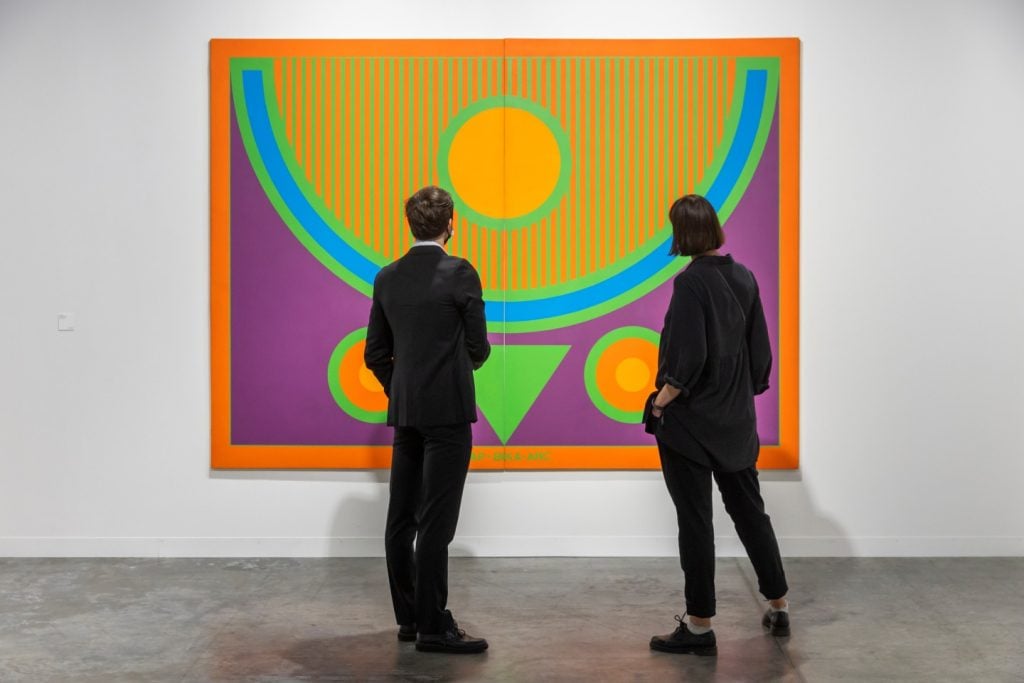Art Fairs
To Adapt to a Changing Market, Art Basel Is Eliminating Old Rules That Barred Younger Galleries From the Fair
The change is part of a broader overhaul of the historically strict criteria galleries need to meet in order to apply.

The change is part of a broader overhaul of the historically strict criteria galleries need to meet in order to apply.

Julia Halperin

Getting accepted to Art Basel Miami Beach as a dealer is kind of like becoming a federal judge—most of the time, it’s a lifetime appointment.
Securing one of these very coveted slots has historically required not only a strong professional track record, but the meeting of very particular, stringent criteria.
Now, the fair is beginning to relax those long-held rules. There is no longer a minimum age requirement for galleries to apply (previously, galleries had to be at least three years old). Applicants are also no longer required to have a permanent space or stage a set number of exhibitions per year (provided they do, in fact, stage shows).
These changes were quietly adopted for the most recent edition of Art Basel Hong Kong and the current edition of Art Basel Miami Beach. They will also be in effect for the forthcoming editions of Art Basel in Switzerland and Hong Kong in 2022, an Art Basel spokesperson confirmed.

Qualeasha Wood, http://, (2021). Courtesy Gallery Kendra Jayne Patrick.
The revisions were initially presented as exceptional pandemic-era concessions to encourage new applicants at a time when dealers were stymied by travel restrictions or had been forced to close their storefronts.
Now, citing a desire to increase diversity among exhibitors and an openness to new models developed during lockdown, fair organizers say the changes will become standard practice. (They cautioned, however, that eligibility criteria are reviewed annually with each fair’s selection committee.)
In one Miami-specific update, galleries participating in Nova and Positions—the sections dedicated to new and emerging talents—no longer need to formally represent the artists they show at the fair.
“In the case of Miami Beach, we were starting to see many exciting galleries that had recently opened, in many cases by people with a strong track record in the art world, but who weren’t able to apply under our previous criteria,” a fair spokesperson said. “And while not every gallery that applied under the new rules was accepted, there is no doubt when seeing this year’s fair that it was the right decision to change our rules.”
Some longtime exhibitors expressed skepticism about the new approach. “They want everybody’s $800 [application fee], and that’s going to be 2,000 more applicants,” one dealer said. “At least if you have a lease, your financials have been vetted by a landlord.” (To be fair, application fees for Art Basel Miami Beach and Art Basel Hong Kong are actually $550 for most sections, and just under $600 for the Swiss fair.)
Others noted that the new rules will help the fair remain at the center of the conversation at a time when galleries of all stripes are experimenting with new models, from roving pop-ups to advisor-dealer fusions.
“The bricks don’t call clients—the bricks don’t do anything,” said first-time exhibitor Kendra Jayne Patrick, whose eponymous, itinerant New York gallery is presenting textiles by Qualeasha Wood.
As a millennial, she acknowledged she may have a different approach to property than some of the Art Basel old-timers (though she is also planning to open a project space in Basel, Switzerland, next year).
Her current lack of a permanent address didn’t seem to bother collectors. She nearly sold out her stand at prices ranging from $15,000 to $23,000 within the first three hours of the VIP preview.